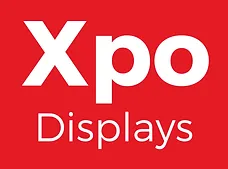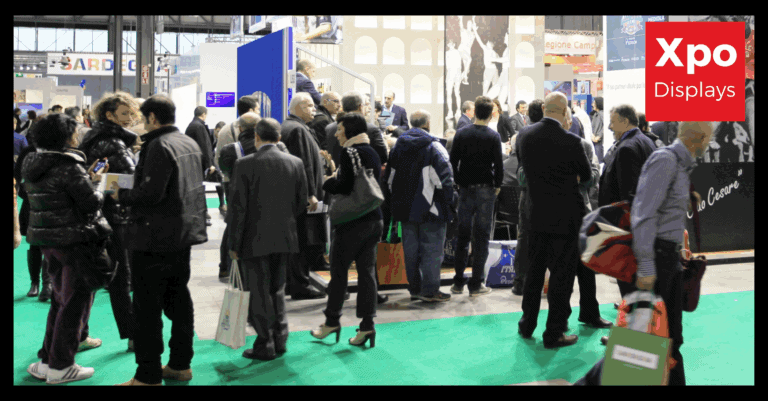Ever walked into a buzzing hall full of eye-catching displays, new tech demos, and business chatter echoing off every corner?
That’s the unmistakable energy of a trade show.
Whether you’re an industry veteran or thinking about attending your first event, understanding what a trade show is (and why it matters) can be your ticket to trade show success.
Quick Answer: What Is a Trade Show?
A trade show is a major event where companies gather to showcase their products or services to a targeted audience. Usually held at large venues, these exhibitions are designed for networking, lead generation, and discovering the latest industry trends.
Trade shows can be open to the public or restricted to industry professionals. Some focus on business-to-business (B2B) connections, while others target consumers directly.
In short: A trade show is your chance to connect, learn, and grow within a specific industry.
The Purpose of a Trade Show: Why Do We Have Them?
The main purpose of a trade show is to bring together exhibitors and attendees from a specific industry. This creates a unique space for networking opportunities, knowledge exchange, and brand visibility.
As someone who has set up a booth at more than a dozen UK trade shows, I can tell you that these events are far more than just a sales opportunity. They’re buzzing hubs for:
- Showcasing new products and services
- Building partnerships and connecting with prospects
- Gaining media coverage and raising brand awareness
- Learning from industry experts through keynote speeches and breakout sessions
Trade shows allow companies to demonstrate their latest innovations, generate high-quality leads, and gain insights from direct feedback.
You might come for the sales and marketing, but you stay for the relationships and learning.
Types of Trade Shows: Industry vs. Consumer
Trade shows may look similar on the surface, but the audience and goals can be quite different. Here’s what you need to know about the two main types of trade shows.
Industry Trade Shows (B2B)
Industry trade shows are usually business-to-business (B2B) events. These are closed events, open only to industry professionals. The focus here is on forming partnerships, learning about the latest products, and staying ahead of industry trends.
I find these shows to be the best for networking, as everyone in the room shares your professional language and goals. Companies showcase their products and services in a way that appeals to other businesses, suppliers, or distributors.
Consumer Trade Shows (B2C)
Consumer trade shows, or B2C events, open their doors to the public. Think of the Ideal Home Show or Comic Con in London. These expos are designed to attract a broader audience, including families, hobbyists, and everyday shoppers.
Consumer shows offer direct access to potential customers, and you can often see live demonstrations, get hands-on with new products, or even score exclusive deals.
Hybrid Trade Shows
Hybrid trade events combine in-person and online elements. Over the last few years, I’ve attended several hybrid trade shows where virtual attendees could view live streams, join digital networking opportunities, or even take part in Q&A sessions from anywhere in the world.
Hybrid trade shows expand your reach—connecting you with a global audience while still offering face-to-face engagement.
What’s the Difference Between a Trade Show and a Trade Fair?
You might wonder, “What’s the difference between a trade show and a trade fair?” The terms are often used interchangeably in the UK, but generally, a trade show focuses on showcasing new products and services for a targeted audience, while a trade fair might be slightly larger and more open, sometimes including both trade and public days.
How Trade Shows Work: A Day at the Expo

Walking through an exhibition hall, you’ll see rows of booths, each designed to grab your attention. Here’s what you can expect:
- Booth Space and Booth Design: Companies invest in creative booth designs to stand out. As an exhibitor, I’ve learned that a visually striking display draws in more foot traffic and sparks conversations.
- Product Demonstrations: Live demos are everywhere, from virtual reality headsets to kitchen gadgets. These demonstrations give attendees a hands-on experience and help exhibitors showcase their products.
- Networking Opportunities: Whether during scheduled breakout sessions or impromptu chats by the coffee stand, networking is a huge part of the experience.
- Educational Opportunities: Most trade shows feature keynote speeches from industry experts, panel discussions, and workshops. I always make time to attend these, as they offer insights you won’t find anywhere else.
The event agenda varies from show to show, but the goal remains the same: to connect, learn, and grow.
Exhibitors: Who Sets Up at Trade Shows?
Exhibitors range from global corporations to smaller companies trying to make their mark. Some bring entire teams to staff their booth, while others send just a few experts to engage with potential customers.
If you’re thinking about exhibiting, remember that your trade show booth is your shop window. Make it count!
Attendees: Who Comes to Trade Shows?
Trade shows attract a mix of attendees, including:
- Industry professionals looking to learn about new products
- Buyers and procurement managers
- Journalists seeking media coverage
- Students and job seekers
- Curious members of the public (at consumer trade shows)
Attending trade shows to learn, connect, and discover new opportunities can be a game-changer for your career or your business.
Examples of Trade Shows: Real-World Events
To make this more tangible, here are some well-known examples of trade shows you might recognise:
- The London Book Fair: An industry trade show for publishers, agents, and authors.
- BETT Show: A major event for education technology companies and educators.
- Ideal Home Show: A consumer show focused on home improvement and lifestyle.
- The Business Travel Show: A B2B event where travel professionals and suppliers connect.
Examples include everything from fashion expos to tech exhibitions, each tailored to its own specific industry.
Why Attend a Trade Show? The Real Benefits
Attending trade shows offers more than just the chance to see new products or services. Here’s why I always clear my calendar for the next trade show:
1. Networking Opportunities:
Meet partners, clients, and industry experts face-to-face. These connections often lead to long-term business relationships.
2. Lead Generation:
Trade shows can help you generate business by meeting people who are actively searching for solutions you offer. I’ve collected hundreds of high-quality leads at UK expos, simply by striking up conversations with attendees.
3. Brand Visibility:
Standing out at a trade show boosts your visibility and awareness. Media coverage from these events can introduce your brand to a wider audience.
4. Educational Opportunities:
Listen to thought leaders, attend breakout sessions, and soak up the latest industry knowledge.
5. Product Launches:
Trade shows provide the perfect stage to unveil new products or services. The immediate feedback from attendees can shape your next big idea.
If you want to learn about the latest products and services or connect with prospects, there’s no better place than a trade show.
Planning Your Trade Show Experience
If you’re attending as an exhibitor or attendee, planning is key. Here’s my quick guide:
For Exhibitors:
- Book your booth space early, as prime locations go fast.
- Invest in booth design that reflects your brand.
- Plan demonstrations and prepare marketing materials.
- Train your team for lead generation and networking.
For Attendees:
- Register in advance and check the event agenda.
- Plan travel and accommodations if the venue is out of town.
- Make a shortlist of must-see booths and sessions.
- Bring business cards and an open mind.
A little preparation ensures you make the most of your trade show visit.
Trade Show Venues: Where the Magic Happens
Trade show venues vary greatly, from purpose-built exhibition halls to unique spaces like hotels, stadiums, or even outdoor sites. In the UK, I’ve attended shows at ExCeL London, the NEC Birmingham, and Manchester Central.
Each venue has its own vibe, but all provide the infrastructure (power, Wi-Fi, security, catering) you need for a successful event.
Picking the right venue can make or break your trade show experience.
The Future of Trade Shows: Going Hybrid and Digital
The pandemic pushed many expos entirely online, but in-person events are roaring back. Still, hybrid trade shows are here to stay, offering the best of both worlds.
Hybrid trade events mean you can reach a broader audience, offer flexible attendance options, and cut costs on travel and accommodations. I think the best shows blend digital and physical seamlessly, creating more ways for exhibitors and attendees to connect.
TL;DR: What Makes a Trade Show Special?
- A trade show is an event where companies showcase their products or services to a targeted audience.
- Trade shows come in many types: industry, consumer, and hybrid.
- The purpose of the event is networking, lead generation, education, and brand visibility.
- Planning, preparation, and participation are key to trade show success.
Whether you’re attending, exhibiting, or just curious, trade shows are where industry professionals gather to showcase, learn, and grow.
Ready for your next trade show adventure? I’ll see you at the exhibition hall!






